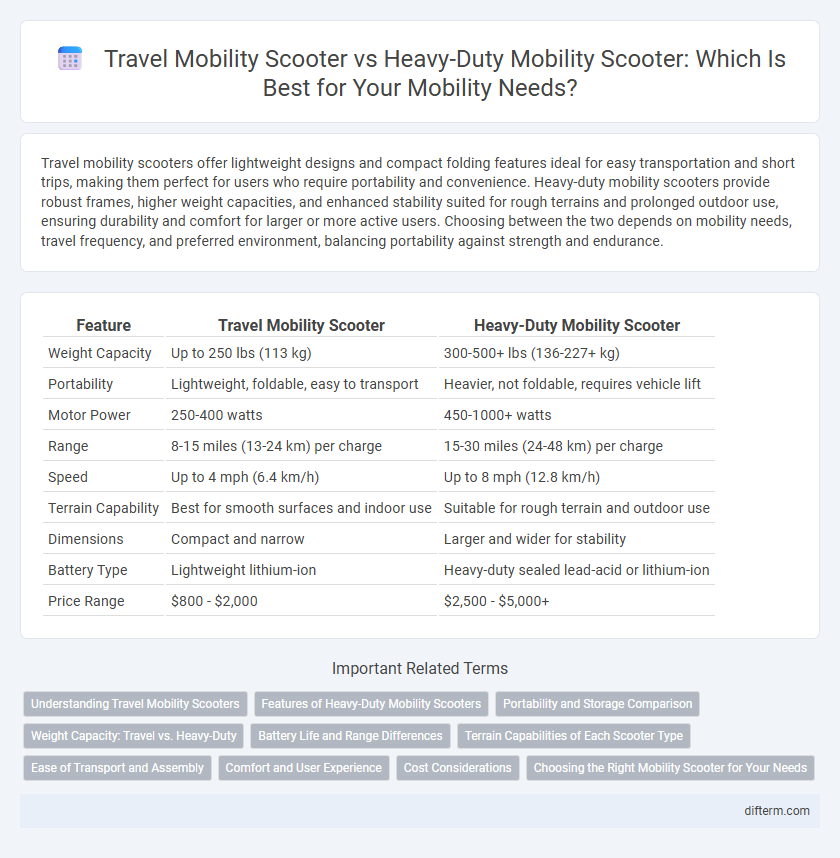Travel mobility scooters offer lightweight designs and compact folding features ideal for easy transportation and short trips, making them perfect for users who require portability and convenience. Heavy-duty mobility scooters provide robust frames, higher weight capacities, and enhanced stability suited for rough terrains and prolonged outdoor use, ensuring durability and comfort for larger or more active users. Choosing between the two depends on mobility needs, travel frequency, and preferred environment, balancing portability against strength and endurance.
Table of Comparison
| Feature | Travel Mobility Scooter | Heavy-Duty Mobility Scooter |
|---|---|---|
| Weight Capacity | Up to 250 lbs (113 kg) | 300-500+ lbs (136-227+ kg) |
| Portability | Lightweight, foldable, easy to transport | Heavier, not foldable, requires vehicle lift |
| Motor Power | 250-400 watts | 450-1000+ watts |
| Range | 8-15 miles (13-24 km) per charge | 15-30 miles (24-48 km) per charge |
| Speed | Up to 4 mph (6.4 km/h) | Up to 8 mph (12.8 km/h) |
| Terrain Capability | Best for smooth surfaces and indoor use | Suitable for rough terrain and outdoor use |
| Dimensions | Compact and narrow | Larger and wider for stability |
| Battery Type | Lightweight lithium-ion | Heavy-duty sealed lead-acid or lithium-ion |
| Price Range | $800 - $2,000 | $2,500 - $5,000+ |
Understanding Travel Mobility Scooters
Travel mobility scooters are designed for lightweight, portable use, ideal for short-distance travel and easy transport on planes or public transit. These scooters typically weigh between 30 to 60 pounds and feature compact sizes with foldable or easily disassembled parts. Unlike heavy-duty mobility scooters, travel models prioritize maneuverability, battery efficiency for moderate range, and user-friendly controls suited for urban environments or casual outings.
Features of Heavy-Duty Mobility Scooters
Heavy-duty mobility scooters feature reinforced frames and higher weight capacities, often supporting up to 500 pounds or more, designed for users requiring robust support and stability. They offer larger, all-terrain tires and enhanced suspension systems to navigate uneven surfaces and outdoor environments effectively. Extended battery life and powerful motors provide greater range and speed, ideal for long-distance travel and challenging terrains.
Portability and Storage Comparison
Travel mobility scooters offer lightweight designs and compact folding features, making them ideal for easy portability and storage in small car trunks or airplane compartments. Heavy-duty mobility scooters, while providing superior power and stability, tend to be larger and heavier, requiring more storage space and often necessitating specialized transport solutions. Choosing between the two depends on balancing portability needs against power and durability requirements for daily mobility.
Weight Capacity: Travel vs. Heavy-Duty
Travel mobility scooters typically support weight capacities ranging from 250 to 300 pounds, making them suitable for users prioritizing portability and lighter weight. Heavy-duty mobility scooters, on the other hand, often accommodate weight capacities exceeding 400 pounds, designed to provide enhanced stability and strength for larger individuals. Choosing between these types depends on the user's weight requirements and intended usage environment.
Battery Life and Range Differences
Travel mobility scooters typically feature smaller, lightweight batteries that offer a range of 10 to 15 miles per charge, ideal for short trips and easy portability. Heavy-duty mobility scooters are equipped with larger, more powerful batteries, enabling ranges of up to 25 to 40 miles and extended usage times suitable for rough terrains and longer distances. Battery longevity in heavy-duty models is enhanced by higher-capacity lithium-ion or deep-cycle lead-acid batteries, providing reliable performance for extended outdoor mobility.
Terrain Capabilities of Each Scooter Type
Travel mobility scooters excel on smooth, paved surfaces and are lightweight for easy transport and maneuverability in urban environments. Heavy-duty mobility scooters feature robust tires, stronger suspension systems, and higher ground clearance, allowing them to handle rough terrains such as gravel paths, grass, and uneven outdoor trails effectively. Choosing between these scooters depends on the primary use environment, with travel scooters suited for indoor and city mobility, while heavy-duty models are optimized for rugged outdoor terrain.
Ease of Transport and Assembly
Travel mobility scooters offer lightweight designs and foldable or detachable features that enable effortless transport and quick assembly, ideal for frequent travelers. Heavy-duty mobility scooters are bulkier, often requiring more time and effort to disassemble and transport, making them less convenient for on-the-go mobility. Compact frames and modular components in travel models enhance portability without sacrificing functionality.
Comfort and User Experience
Travel mobility scooters prioritize lightweight design and portability, enhancing user comfort through easy maneuverability and convenience during transit. Heavy-duty mobility scooters offer robust suspension systems and spacious seating, providing superior comfort for extended use and accommodating users with higher weight capacities. The user experience on travel models focuses on simplicity and compactness, while heavy-duty options emphasize durability and stability for varied terrains.
Cost Considerations
Travel mobility scooters generally offer a lower initial cost, ranging from $800 to $2,500, making them accessible for users seeking portability and ease of use. Heavy-duty mobility scooters can exceed $3,000 due to their enhanced durability, larger batteries, and stronger motors designed for rough terrain and extended use. Maintenance and repair costs tend to be higher for heavy-duty models because of their complex components and heavier parts.
Choosing the Right Mobility Scooter for Your Needs
Selecting the right mobility scooter depends on your specific travel needs and environment; travel mobility scooters offer lightweight, compact designs ideal for short trips and easy transport, while heavy-duty mobility scooters provide robust frames, longer battery life, and higher weight capacities suited for rough terrains and extended outdoor use. Consider factors such as battery range, terrain type, portability, and storage space to determine which scooter best supports your daily activities and lifestyle. Evaluating these key features ensures optimal comfort, safety, and mobility independence.
travel mobility scooter vs heavy-duty mobility scooter Infographic

 difterm.com
difterm.com